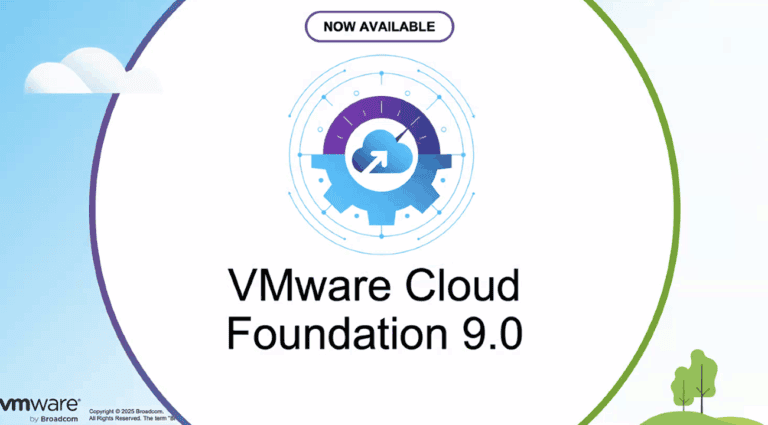Broadcom today launched VMware Cloud Foundation 9 (VCF 9). The new version is designed to help organizations build a modern private cloud with enhanced automation, improved security, and support for both virtual machines (VMs) and containers. VMs and containers are now equal. VCF 9 is designed to help organizations build their own private cloud more easily.
According to Broadcom, VCF 9 includes more than 100 new features and functionalities. The most important innovations focus on three areas: infrastructure modernization, developer experience, and cybersecurity.
One of the significant improvements is the new VMware Cloud Foundation Operations Console. This provides a unified interface for building, managing, and maintaining the private cloud. IT administrators can use it to automate their day 0, day 1, day 2, and end-of-day operations.
Cost transparency and governance
VCF 9 introduces comprehensive cost visibility at both the infrastructure and application levels. Administrators can view the exact resource allocation and costs for each tenant, cluster, or workload. This enables chargeback (invoicing) and showback (showing insight into resource consumption costs without invoicing) in multi-tenant environments.
Identity management, certificate management, and password policy are fully automated. A new security operations dashboard provides proactive insights into the infrastructure.
Private cloud is more popular than ever, according to research
Broadcom based the development of VCF 9 on its Private Cloud Outlook survey. This survey shows that 93% of organizations waste money on public cloud, with more than 50% saying that 25% of their spending is wasted. Additionally, 69% of organizations are repatriating workloads from public clouds to private clouds.
The reasons for this shift are mainly cost transparency, security, and performance for AI workloads. IT teams want more control over their infrastructure and better cost control.
VCF 9 runs both VMs and containers
An important step forward is native support for Kubernetes containers. VMs and containers are now treated as equivalent workloads with the same set of infrastructure services. Developers get access to consistent APIs and IaaS services, regardless of whether they are working with traditional VMs or modern containerized applications.
The new VCF Automation Console provides tenant-level resource management with VPCs (Virtual Private Clouds), enabling control over isolation at the application level. Self-service capabilities should drastically reduce development times.
Powerful infrastructure enhancements
At the infrastructure level, Broadcom VMware has implemented several impressive improvements. The new NVMe memory tiering in ESXi can optimize working memory by moving cold memory to more cost-effective NVMe storage. This results in 38% lower memory and server costs.
Other improvements include vSAN and deduplication, which are expected to reduce storage TCO by 34%. NSX Enhanced Data Path offers 3x better performance for east-west network traffic, which is crucial for latency-sensitive AI workloads.
According to VMware, the impact of VCF 9 on infrastructure is minimal, with 99% of bare-metal performance retained for AI workloads, while all virtualization benefits, such as VMotion, remain available. GPU VMotion is now also possible for AI workloads.
Advanced services and partnerships
In addition to VCF 9, Broadcom announced several Enhanced Services. The Data Services Manager offers an enterprise database-as-a-service solution with support for PostgreSQL, MySQL, and SQL Server. The Private AI Foundation gains GPU-as-a-service capabilities and enhanced AI agent functionality.
The VMware Live Recovery service can now recover to isolated on-premises clean rooms. VDefend security offers self-service micro-segmentation and per-VPC lateral security.
VMware expects many major OEM partners to release co-engineered solutions within two to three months. According to VMware, more than 30 cloud service providers are said to have participated in the beta program.
Availability
VCF 9 is immediately available to all existing VCF and VVF subscription customers as an upgrade. However, this is only under Broadcom’s new VMware strategy, which means no perpetual licenses, only subscriptions.
The launch underscores Broadcom’s focus on enterprise customers looking to invest in modern private cloud infrastructure. Whether VCF 9 can indeed become “the AWS for on-premises,” as Broadcom claimed during previous events, remains to be seen.
